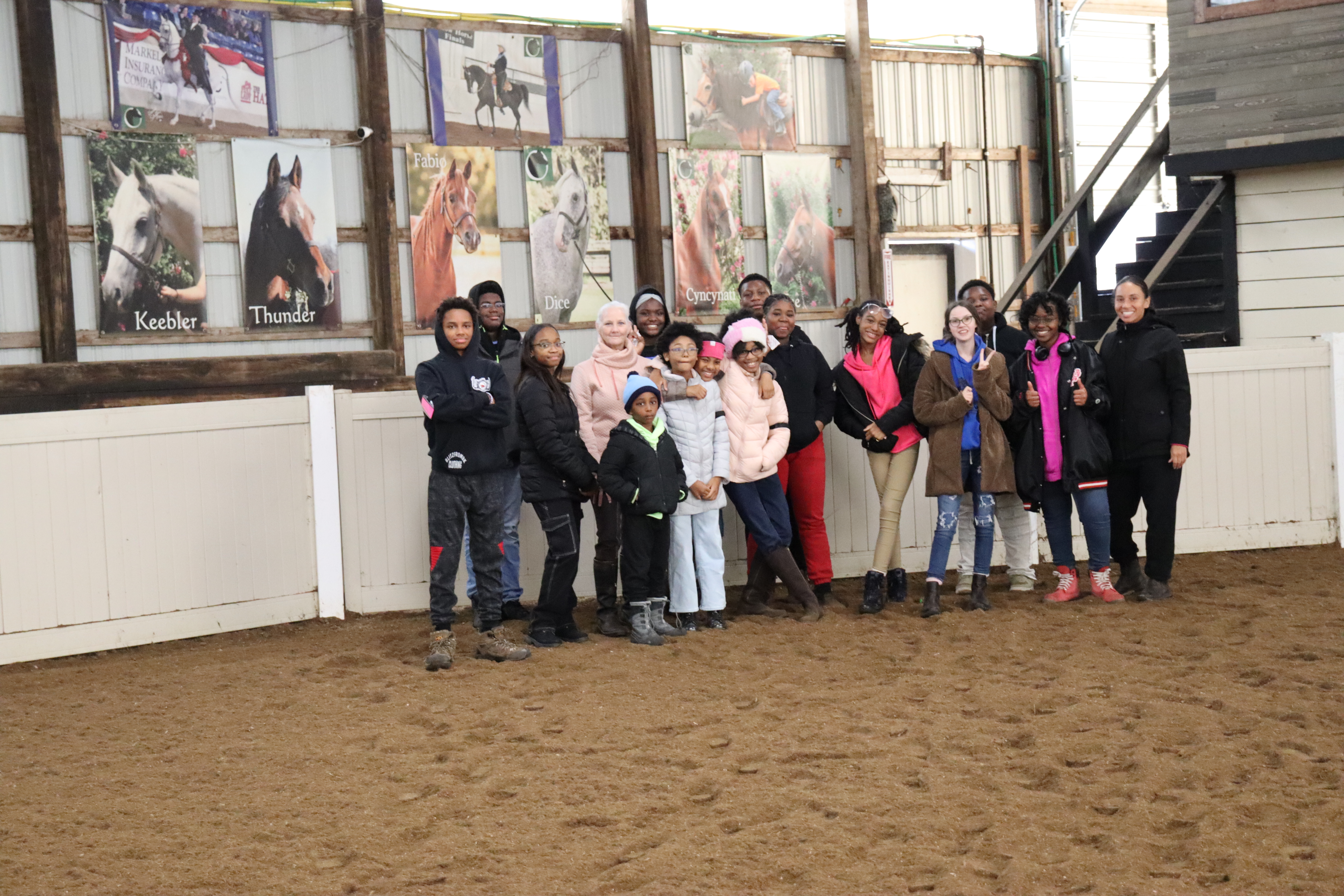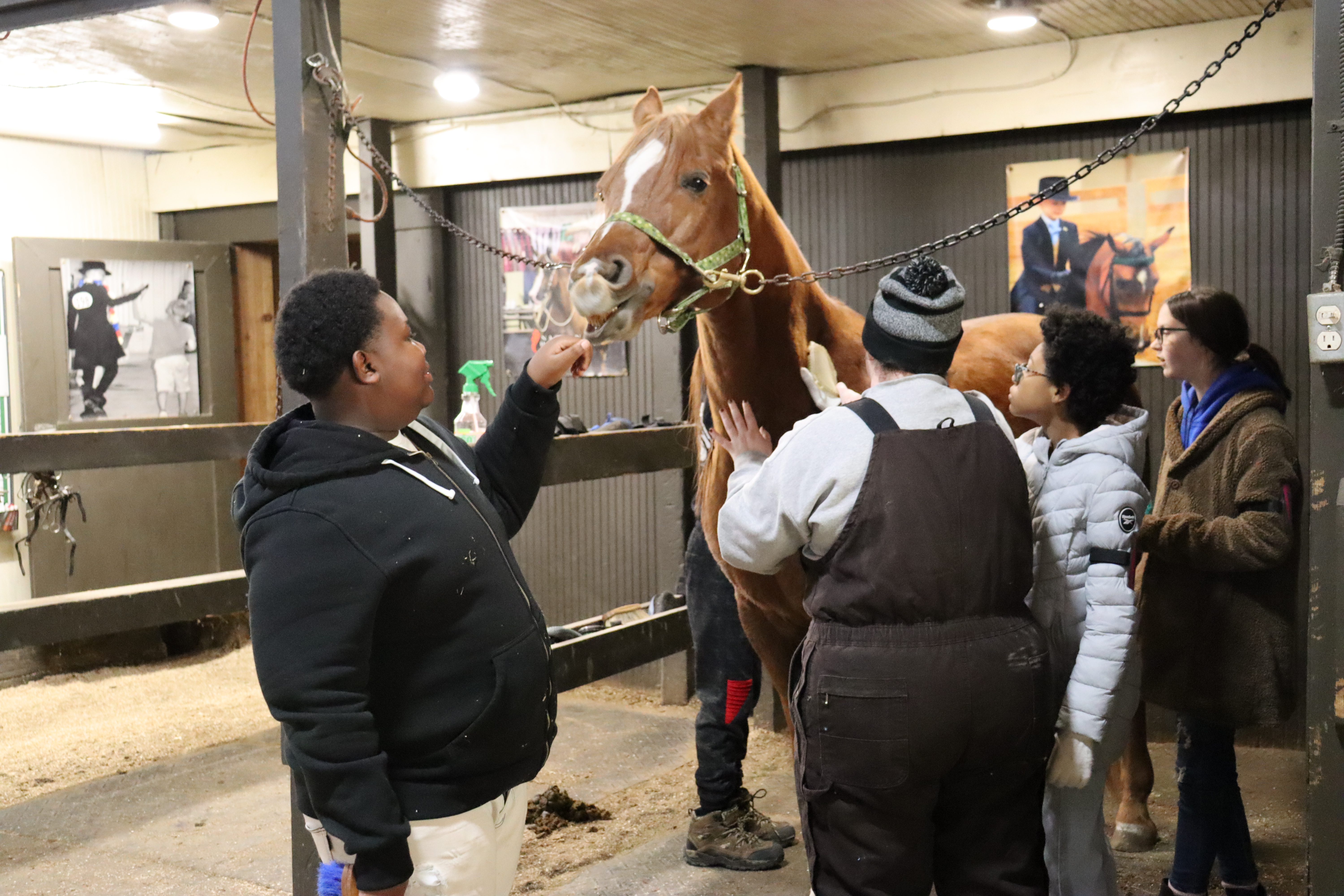Detroit Horse Power Harnesses New Opportunities for Detroit’s Youth

Detroit Horse Power students receiving riding lessons at Rushlow’s Arabian Farm, Romulus, MI, Nov. 12, 2023. Photo by Zynab Al-Timimi
Local non-profit Detroit Horse Power will be transforming 14 acres of vacant land leased from the Detroit Public Schools Community District in the Hope Village neighborhood and creating the largest inner-city equestrian center in Michigan.
The $8.1 million facility is expected to open within two years.
David Silver is the founder and executive director of Detroit Horse Power, which introduces Detroit’s youth to the equestrian sport as a way to develop important life skills for future success.
Silver grew up in the suburbs of New York City with his mother, who was a horseback rider for most of her life. This gave Silver the privilege of accessing horses throughout his childhood, since his mother wanted to ensure that he could treasure the same experiences. Years later, Silver moved to New Hampshire, where he attended Dartmouth College.
In 2012, he settled in Detroit to become an elementary school teacher. Silver taught all subjects to fourth and fifth graders at Burns Elementary-Middle School on the west side of Detroit for two years. Silver says, “I became passionate about stepping outside the classroom and teaching Detroit students because of the critical skills horses taught me as a child.” This enthusiasm drove Silver to start the Detroit Horse Power organization and make horses accessible for kids in the city.
The mission of Detroit Horse Power is to teach valuable life lessons to the Detroit youth through riding and taking care of horses. The organization mainly concentrates on five social-emotional skills from the research on education and character development. Silver explains, “Our curriculum is focused on five traits that spell out the acronym PERCS. P for perseverance, E for empathy, R for responsible risk-taking, C for confidence, and S for self-control.” Silver mentions that all five of these traits are incorporated into everything they do because horses can be significant teachers for the internal skills that students can take to be more successful in school and life.
Detroit Horse Power students learning to care for horses at Rushlow's Arabians horse farm, Romulus, MI. Photo by Zynab Al-Timimi
Silver focuses mainly on kids in Detroit because, as a teacher in Detroit, he realized most students had never experienced horseback riding. Detroit Horse Power is a way to break down financial and geographic barriers.
Nicole Byrd, Managing Director at Detroit Horse Power, learned about the program through a network of nonprofits in Detroit. Byrd spent a significant portion of her career in nonprofit work, primarily in education. She heard about the program from her former executive director, who shared how much she would enjoy meeting David Silver and what they do at the organization.
Byrd worked with Silver for about a year before she came on board as a staff member for Detroit Horse Power. She has been part of the team for over three years. “I believe in the mission, I love what horses provide for the youth of Detroit, and I value how this program unlocks their hidden potential and talent for riding horses,” Byrd says.
Ciara Ginyard was introduced to the program by one of the board members who admired her passion for youth development work and devotion to ensuring small nonprofits acquire the access required for funding in order to continue to be sustainable and successfully move forward. Ginyard became the development director of Detroit Horse Power in March 2023.
“I love the focus of the mission and the youth that radiates positivity. I also connected with the executive director, David Silver. We had great conversations and alignment that immediately gravitated me towards the Detroit Horse Power family,” Ginyard says.
The organization maintains two primary programs: Summer Horse Camp and the After School Horse Program. The summer camp is one week long, allowing a different group of students to visit each week and become familiar with the environment before committing to the after-school program. “We reach around 100 students in a typical summer. That involves picking students up in the morning and driving them far distances to numerous horse farms around Michigan,” Silver notes. At the moment, Detroit Horse Power does not own a horse farm. Therefore, they travel to various farms whose owners are generous enough to allow the Detroit youth to practice horseback riding.
Sally Rushlow and her family own Rushlow’s Arabian Farm. They are one of many gracious owners who allow Detroit Horse Power to use their space for teaching students and providing horses and riding lessons. Rushlow says, “The Horse Arena was built in 1973, when I was around 13 years old. My parents believed the space for the horses was too small. So, they decided to build an arena large enough for riding horses indoors.” Rushlow’s Arabian Farm holds 75 horses in total.
Detroit Horse Power’s after-school program teaches students how to ride and take care of horses. The program invites guest speakers to discuss their professions in the horse industry, like veterinarians or blacksmiths. Silver states, “Currently, forty-four students are part of the year-round after-school program. We meet on weekday evenings, Tuesdays, Wednesdays, and Thursdays at barns that let us use their space to preserve the strong connection with horses.”
Detroit Horse Power has held its programs and events in Southeast Michigan at five locations this summer: White Lake, Celine, Davisburg, Holly, and Plymouth. However, the after-school program travels in a wide radius to more than a dozen distinct locations. “Students in the city of Detroit lack resources in their schools that provide them with the five PERCS. So, our after-school program fills that gap for students,” Byrd notes.
The organization primarily recruits students from Detroit-based community partners, such as schools or other nonprofit organizations that send students for one week each. For those not associated with an organization, there is a waiting list. On the contact page of Detroit Horse Power’s website, an email address can be used to sign up for the waiting list. Currently, they offer placement for participants who are middle and high-school-aged students. “In the future, we’ll start recruiting members at younger ages once we start expanding. At the moment, we have a lot of demand that narrowing the age ranges was required to be able to focus on a smaller pool of participants,” Silver notes.
Cassidy Johnson is a 12-year-old student member of Detroit Horse Power. Johnson is currently in the eighth grade and has been a member for approximately a year. She became involved in the program after hearing about it from her mom.
Johnson says, “What I like most about horses is the way they make me feel more comfortable around people. I don’t enjoy being around huge crowds, especially in the arena. So having a special bond and building on the relationship with the horse I have that day makes me happy and comfortable enough to be myself and step out of my comfort zone.”

Detroit Horse Power student, Cassidy Johnson, receiving riding lesson at Rushlow's Arabians horse farm, Romulus, MI. Photo by Zynab Al-Timimi
A specific process was used to select vacant land in Detroit for the new equestrian center Silver envisions. There were four characteristics Sliver had in mind when aiming for potential vacant land sites. The first was how spacious the region was because Silver wanted an area with at least ten or more acres of vacant land. The second and most important characteristic Silver sought was the neighborhood’s response to horses becoming part of the community’s future. The third distinction Silver examined was the site’s history and whether it had an industrial history that required numerous environmental remediations to address contaminated soil. Lastly, the site would need to be close to a significant number of youth to remove transportation as a barrier to accessing the programs. Silver says, “It took years to find the ideal site. But we’re excited about the location selected because it perfectly hits each characteristic.”
Construction is expected to start on the new equestrian center in the spring of 2024. Once the new facility is open, it will operate throughout the year. “We want to open before the summer of 2025. It’s about a twelve-month construction timeline,” mentions Silver.
Over the years, Silver has received a surprising number of calls from people interested in donating horses to Detroit Horse Power because by contributing a horse, they are eligible for a tax deduction on the value of the horse granted. However, due to the contemporary construction timeline, they have yet to get horses of their own. Silver says, “Once we can accept the donated horses, we will be selective about the right age, temperament, and abilities of the horses coming our way.” Training and caring for the horses will be done partly by the barn manager, riding instructors, and students who will most likely play a vital role in the maintenance of the horses each day with supervision from the staff.
Lacey, the horse ridden by Cassidy Johnson at Rushlow's Arabians horse farm, Romulus, MI. Photo by Zynab Al-Timimi
A capital campaign is funding the new facility. The largest supporters of the capital campaign include the state of Michigan, the Kresge Foundation, and the Meijer Foundation. Once the new equestrian center opens, Silver hopes to expand Detroit Horse Power’s programs. “The summer camp will have five times as many participants as we have today. As well as our after-school program, which will have more than twice as many participants.
What’s even more exciting is that those participants will have more time spent with the horses.” Silver mentions that they will be starting a new field trip program where, during the school day, they bring a group of students, amounting to more than a thousand students, annually to visit the new facility. They will have the opportunity to be introduced to horses and the life lessons they teach us.
Detroit Horse Power is publicized in several ways. First, they take advantage of opportunities such as accepting offers to be interviewed and published in newspapers or articles. The program also connects with different media outlets, such as “Spotlight in Detroit.” Ginyard says, “Word of mouth is the best form of spreading knowledge about the organization and all its benefits for young students. Whether it be from a member of the program informing their family, friends, or neighbors—the name of our program sticks since most of our community members have become well established in one big network in Detroit.”
Detroit Horse Power is continuously seeking volunteers to support its youth programming. Donations are also appreciated to support these programs and expand access to horses. Silver says, “We’d love to get in touch with people who want to get involved because every contribution is greatly valued by me and the rest of our team.”
Information on Detroit Horse Power is available at www.detroithorsepower.org and on Facebook and Instagram @detroithorsepower.

